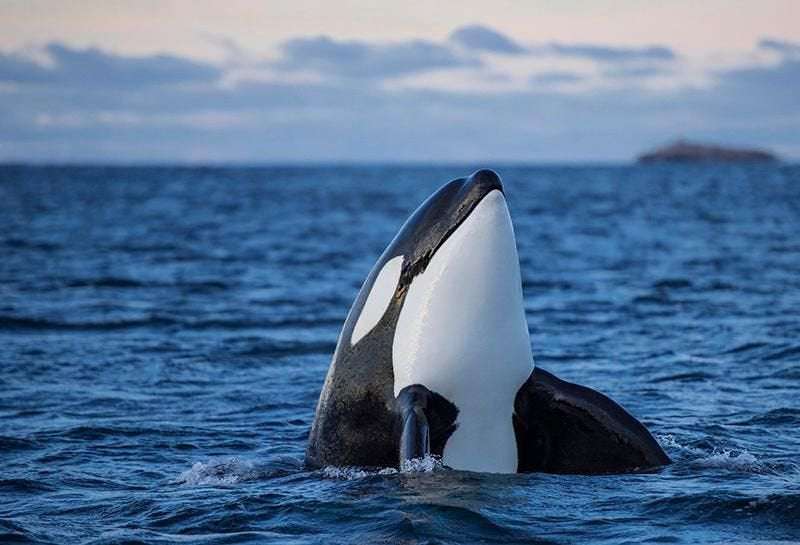It’s pretty much common wisdom that the top predator in the ocean is the great white shark (that is, if there isn’t a remnant population of megalodon hidden somewhere in the deep). But a new study reveals that the massive shark is not the ocean’s top apex predator: that title rightly belongs to orcas, also known as killer whales.
The revelation comes from a paper in Nature Scientific Reports by senior research scientist Salvador Jorgensen at the Monterey Bay Aquarium and his colleagues. Ed Yong at The Atlantic reports that over the years, while studying great white sharks, Jorgensen and his team began to notice that when killer whales entered the scene, the sharks made an exit, and in many cases did not return for months. In particular, in 2009 the team radio-tagged 17 sharks around Southeast Farallon Island in Greater Farallones National Marine Sanctuary, a marine and wildlife refuge off the coast of California. The sharks happily munched on young elephant seals in the waters around the island, which they regularly do between September and December. But when a pod of orcas entered the waters for just a couple of hours, the sharks high-tailed it out of there and most didn’t return that season.
To understand if that situation was common or the whole thing was a fluke, Jorgensen and his team looked deeper in the data, examining information about 165 great white sharks tagged in the Farallones between 2006 and 2013. They compared that with whale, shark and seal surveys collected in the marine sanctuary collected over 27 years.
What they found was a standard pattern. When orca whales entered the area, the sharks bolted from Southeast Farallon and nearby islands. “When confronted by orcas, white sharks will immediately vacate their preferred hunting ground and will not return for up to a year, even though the orcas are only passing through,” Jorgensen says in a press release.
Sarah Sloat at Inverse reports that if the whales get within two miles of the islands, the sharks will pack up and leave. In an average year, researchers are able to document 40 elephant seals eaten by sharks. But in years where the orcas make an appearance, which they did in 2009, 2011 and 2013, that number drops by 62 percent from the previous year. For the seals it can be a win-win situation. If the whales simply pass by and don’t stop to snack but still clear out the sharks, the young seals can chase fish in relative security.
So why are the sharks, which can grow up to 18 feet long, so afraid of orcas? Yong reports that most of what we know about white shark/orca encounters doesn’t end well for the sharks. In 1997, during the first interaction ever recorded, fishermen near Southeast Farallon witnessed a pair of orcas kill a young great white that tried to nose in on the sea lion they were eating. The orcas bashed him to death then ate his liver.
In 2017, five corpses of great white sharks washed up on the beaches of South Africa, all with their livers almost surgically removed. It was the work of orcas, which kill the sharks then make a wound near the calorie-dense shark liver. They then squish the yummy treat out of the shark and leave the rest of the corpse. “It’s like squeezing toothpaste,” Jorgensen tells Yong.
Researchers are beginning to understand how the instinct to avoid predators creates a “landscape of fear” that can have wide-ranging impacts on ecosystems. This new study shows that the concept also applies in the oceans. “We don't typically think about how fear and risk aversion might play a role in shaping where large predators hunt and how that influences ocean ecosystems,” Jorgensen says in the press release. “It turns out these risk effects are very strong even for large predators like white sharks—strong enough to redirect their hunting activity to less preferred but safer areas.”
Let’s just hope those safer hunting grounds aren’t too close to shore.

_Apostate_ on December 7th, 2019 at 10:43 UTC »
Anyone learning about how cool orcas are should know about the killer whales of Eden, which were a tribe of orcas that collaborated with an Australian whaling town to lure and assist in the killing of gray whales. They did so for generations and well over 60-80 years. After each kill the whalers would let the orcas take the gray whale's tongue, and then the orcas gave them the rest. This was known as the Rite of the Tongue and was passed through generations of fishermen.
Throwaway995485 on December 7th, 2019 at 10:09 UTC »
You can tell when there are Orca about...all the tagged sharks fuck off as deep as they can go and stay there.
YourEmperorJustinian on December 7th, 2019 at 09:33 UTC »
Yeah they're smart. They figured out if they tip em upside down and hold they just stop fighting and drown. Then they eat their livers.